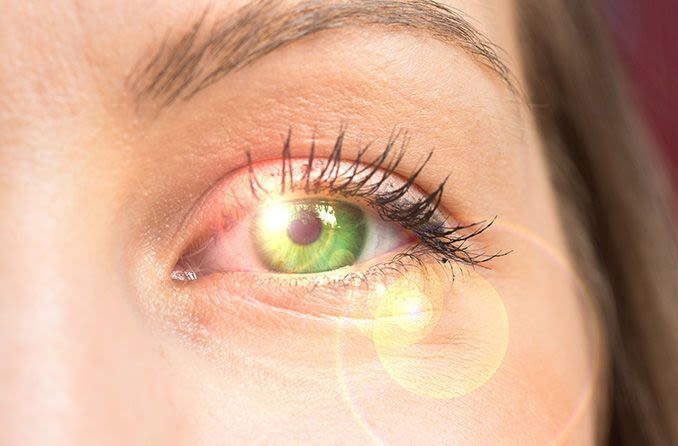How can the sun damage your eyes?

The sun can damage your eyes, even if you don’t realize it. Fortunately, not all sun-related eye conditions are permanent.
For example, did you know that your eyes can get sunburned?
Technically, your corneas suffer sun damage through a condition called photokeratitis. It’s also known as welder's flash, snow blindness and arc eye, though you don’t have to be around welding or snow to get it.
Here are some other eye conditions that can result from ultraviolet (UV) exposure:
The sun is a life-giving force, so how can it be so damaging?
How does the sun damage your eyes?
The sun's UV rays can damage your eyes even when the sky is overcast. There are several categories of UV rays with differing levels of energy: UVA, UVB and UVC.
UVA: Lower-energy UVA rays, which are able to get past the cornea to the lens and retina, have been linked to the development of cataracts and macular degeneration.
UVB: Any UVB rays that make it through the ozone layer are absorbed by the cornea, which can lead to photokeratitis, pingueculae and pterygia.
UVC: While these rays have the potential to be the most damaging, nearly all are blocked by the ozone layer.
Can the sun damage your eyes while you’re wearing sunglasses?
If your sunglasses don’t offer the maximum amount of UV protection (100% UV 400), or if there’s space to the sides of your face where the sun can still get to your eyes, you could still be vulnerable to sun damage.
Wrap-around sunglasses, the preference of many athletes, help block that peripheral sunlight from entering your eyes. Wearing a wide-brimmed hat is another way to protect your face and eyes from the sun's rays.
How long does it take for the sun to damage your eyes?
The length of time it takes for the sun to damage your eyes depends on how long you are staring at the sun without protection.
For example, it only takes 100 seconds for your eyes to incur permanent retinal damage if you’re looking directly at the sun, with no protection, for that entire time.
Prolonged exposure to the sun can damage your eyes over time. That's why it's smart for children to get in the habit of wearing sunglasses whenever they are outside.
Can you go blind from staring at the sun?
Total blindness as a result of sun damage is rare; however, there is a real danger of impairing your vision or even developing temporary or legal blindness.
For example, both cataracts and pterygia are conditions that can obstruct your vision and both can be linked to sun damage.
What does this mean for you and your eyes? Is it possible to heal sun damage? How can you protect yourself?
Can your eyes heal from sun damage?
Because many eye conditions caused by sun damage are temporary — at least, they don’t have to be permanent — healing is possible.
Surgery is a routinely safe and successful option for removing pterygia and pingueculae, and reversing the effects of cataracts.
And, like most sunburns, photokeratitis can heal over time.
How can I protect my eyes from sun damage?
The best thing you can do for your eyes is take measures to shield them from sun damage. Preventing UV rays from gaining access to your eyes will save you a lot of trouble in the long run.
Here are some ways to protect your eyes from the sun:
Wear sunglasses with maximum UV protection: Not all sunglasses offer the same level of protection against harmful UV rays. To make sure you’re covered, only purchase sunglasses that offer UV 400 protection, the maximum level available. UV 400 sunglasses guard against over 99% of UVA and UVB rays.
For an added level of sun protection, consider wrap-around sunglasses, which also protect your peripheral vision.
Wear wide-brimmed hats: Many different types of hats can protect you from the sun, including wide-brimmed hats, sun hats and ball caps, so you can defend your eyes and face from UV rays at any outdoor occasion.
Limit your time in the sun: Of course, the best way to avoid sun damage is to avoid going out in the sun. Not only does the sun damage your eyes, but it wears down and ages your skin, too.
To meet your Vitamin D quota, you need only about 15 minutes in the sun each day, between 10 a.m. and 3 p.m. (And don’t forget about vitamin supplements!)
As focused as we are on vision, it’s important to remember that your eyes aren’t the only body parts at risk of sun damage. To help protect your skin from sunburn, make sure to apply water-resistant, broad-spectrum sunscreen with an SPF of 30 or higher at least 30 minutes before you go outside.
Page published on Friday, February 14, 2020






